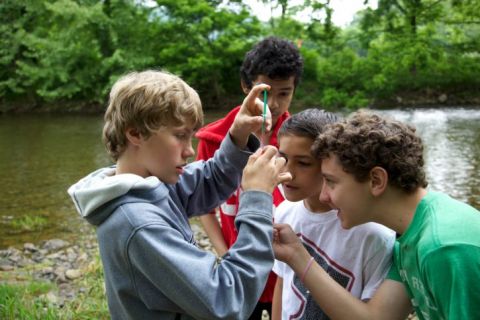Stages of Learning
As you plan your classroom visit, it can be helpful to understand how children of different ages learn, so that you challenge your audience, but don’t turn them off by using overly sophisticated language or introducing science concepts that are beyond their abilities to understand.
Studying how children learn has gone on for over a century. One of the most respected researchers in this area was Jean Piaget (1896 – 1980), a child psychologist from Switzerland. Over many years, he observed and questioned children (including his own three) as they manipulated objects, made drawings, listened to and told stories, and made judgments. He was able to get children to describe their thought processes, and he related these processes to the children’s behavior and language. From his observations and analyses, he identified four sequential stages of intellectual development in children. These are defined as:
- Sensorimotor stage (birth to approximately age 2). During this stage, children, starting with their innate motor reflex actions, progressively learn to cope with their world through sensory stimuli. At this stage, their intelligence is not linked to language.
- Preoperational stage (approximately age 2 to age 7; nursery school and pre-Kindergarten to grade 2). Children in this stage respond to and use language as part of their thinking, but are unable to use logical thinking or operations. They are highly egocentric and they think in the "here and now". They learn best by direct experiences, such as handling and manipulating objects. They can begin to classify objects and events, and begin to think of things that are beyond their direct observations.
- Concrete operational (approximately age 7 to age 11; end of grade 2 to early grade 6). In this stage, children start to use logic as they reason. They also understand conservation, which means that elements such as area, weight, and substance do not change if their positions change. They also understand the inverse of actions they may take (reversibility). They are able to see something from another's point of view. However, they are largely restricted in their thinking to "concrete" objects and events. They cannot think in terms of overall principles, theories, or abstractions. They are limited by the "what is" and cannot focus on the "what could be."
- Formal operational (after approximately age 11; late grade 6 and beyond). At the formal operational stage, children can begin to reflect on their own thinking processes. They can now reason in abstract terms, and generalize about principles. For example, where, in earlier developmental stages a child might think "that person's behavior is bad and he should be punished", they can now think more abstractly and say "all bad behavior is wrong, but sometimes it can be justified for other reasons."
The key point of Piaget's theories is that the four stages of development are sequential. Children cannot reach a new stage until they have gone through and have come to terms with the experiences of the preceding stage. At the same time, it is important to note that some children reach stages at an earlier or a later age than those indicated. Children act upon new objects, events, experiences, and ideas using the prior experience they already have in a process that Piaget calls assimilation. In acting upon the results of these new stimuli, Piaget says they are accommodating these results by learning and incorporating new ideas and behaviors. The relationship between assimilation and accommodation, which has its origins in biology, is at the heart of Piaget's theories of intellectual development. Years later, it remains at the heart of what is today termed constructivism. Although subsequent researchers have added to and refined Piaget’s stages, they have still held up over time.
Here’s what these developmental stages mean to you as you plan and carry out classroom visits with different ages of children: In the earlier grades (K - 2), most children are still preoperational. This means that the science experiences they have must take into account that the children see the world as "me-focused". They need a great many hands-on experiences using simple, everyday objects and materials such as magnifiers, containers of various volumes, non-standard measuring tools, building blocks, rocks and minerals, fossils, water, and sand. It is important that you choose or create science experiences for preoperational children so that they have ample time to explore items, as well as to talk about their discoveries. In this way, you can help them to understand such ideas as: liquids are conserved no matter what the size of their container; or that it is possible to group objects in many different ways.
Older children, those at the concrete operational level, are able to investigate a number of simple science questions, but should do these using as many direct experiences as possible. Such experiences should involve measuring tools, simple laboratory equipment, plants and animals in the classroom, everyday objects, field experiences, videos, and many more. Having children work in collaborative groups as they investigate gives them the opportunity to talk about what they are investigating and what they have found out. In this way, they begin to recognize patterns and relationships in data - an important step along the path to the formal operational level.
While most older elementary children are in the concrete operational stage, you may encounter some who have some formal operational abilities. Children at this level are ready to learn about hypothesis-testing as a way of investigating science questions. They may be able to understand that scientific theories are based upon the results of many experiments, and can be used as the starting points for further experiments

